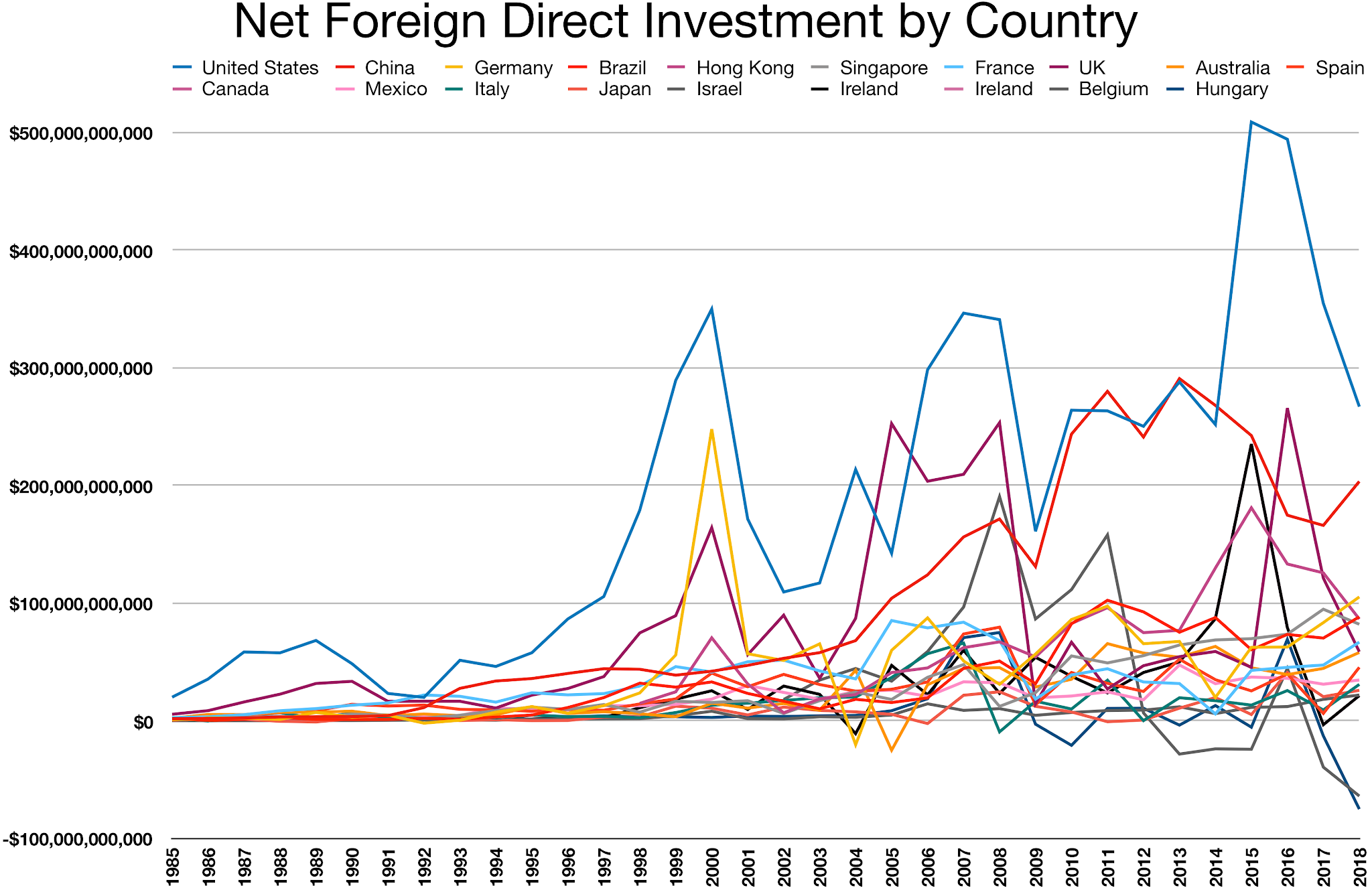What is the FDI? What is the FDI policy of India?
Foreign Direct Investment (FDI) What is the FDI? What is the FDI policy of India?
FDI refers to the flow of capital between countries. According to the United Nations Conference for Trade and Development (UNCTAD), FDI is ‘investment made to acquire lasting interest in enterprises operating outside of the economy of the investor.
Definitions
Broadly, foreign direct investment includes "mergers and acquisitions, building new facilities, reinvesting profits earned from overseas operations, and intra company loans". In a narrow sense, foreign direct investment refers just to building new facility, and a lasting management interest (10 percent or more of voting stock) in an enterprise operating in an economy other than that of the investor. FDI is the sum of equity capital, long-term capital, and short-term capital as shown in the balance of payments. FDI usually involves participation in management, joint-venture, transfer of technology and expertise. Stock of FDI is the net (i.e., outward FDI minus inward FDI) cumulative FDI for any given period. Direct investment excludes investment through purchase of shares (if that purchase results in an investor controlling less than 10% of the shares of the company).
FDI, a subset of international factor movements, is characterized by controlling ownership of a business enterprise in one country by an entity based in another country. Foreign direct investment is distinguished from foreign portfolio investment, a passive investment in the securities of another country such as public stocks and bonds, by the element of "control". According to the Financial Times, "Standard definitions of control use the internationally agreed 10 percent threshold of voting shares, but this is a grey area as often a smaller block of shares will give control in widely held companies. Moreover, control of technology, management, even crucial inputs can confer de facto control.
Theoretical background
According to Grazia Ietto-Gillies (2012),[4] prior to Stephen Hymer’s theory regarding direct investment in the 1960s, the reasons behind foreign direct investment and multinational corporations were explained by neoclassical economics based on macro economic principles. These theories were based on the classical theory of trade in which the motive behind trade was a result of the difference in the costs of production of goods between two countries, focusing on the low cost of production as a motive for a firm's foreign activity. For example, Joe S. Bain only explained the internationalization challenge through three main principles: absolute cost advantages, product differentiation advantages and economies of scale. Furthermore, the neoclassical theories were created under the assumption of the existence of perfect competition. Intrigued by the motivations behind large foreign investments made by corporations from the United States of America, Hymer developed a framework that went beyond the existing theories, explaining why this phenomenon occurred, since he considered that the previously mentioned theories could not explain foreign investment and its motivations.
Facing the challenges of his predecessors, Hymer focused his theory on filling the gaps regarding international investment. The theory proposed by the author approaches international investment from a different and more firm-specific point of view. As opposed to traditional macroeconomics-based theories of investment, Hymer states that there is a difference between mere capital investment, otherwise known as portfolio investment, and direct investment. The difference between the two, which will become the cornerstone of his whole theoretical framework, is the issue of control, meaning that with direct investment firms are able to obtain a greater level of control than with portfolio investment. Furthermore, Hymer proceeds to criticize the neoclassical theories, stating that the theory of capital movements cannot explain international production. Moreover, he clarifies that FDI is not necessarily a movement of funds from a home country to a host country, and that it is concentrated on particular industries within many countries. In contrast, if interest rates were the main motive for international investment, FDI would include many industries within fewer countries.
Another observation made by Hymer went against what was maintained by the neoclassical theories: foreign direct investment is not limited to investment of excess profits abroad. In fact, foreign direct investment can be financed through loans obtained in the host country, payments in exchange for equity (patents, technology, machinery etc.), and other methods. The main determinants of FDI is side as well as growth prospectus of the economy of the country when FDI is made. Hymer proposed some more determinants of FDI due to criticisms, along with assuming market and imperfections. These are as follows:
Firm-specific advantages: Once domestic investment was exhausted, a firm could exploit its advantages linked to market imperfections, which could provide the firm with market power and competitive advantage. Further studies attempted to explain how firms could monetize these advantages in the form of licenses.
Removal of conflicts: conflict arises if a firm is already operating in foreign market or looking to expand its operations within the same market. He proposes that the solution for this hurdle arose in the form of collusion, sharing the market with rivals or attempting to acquire a direct control of production. However, it must be taken into account that a reduction in conflict through acquisition of control of operations will increase the market imperfections.
Propensity to formulate an internationalization strategy to mitigate risk: According to his position, firms are characterized with 3 levels of decision making: the day to day supervision, management decision coordination and long term strategy planning and decision making. The extent to which a company can mitigate risk depends on how well a firm can formulate an internationalization strategy taking these levels of decision into account.
Hymer's importance in the field of International Business and foreign direct investment stems from him being the first to theorize about the existence of multinational enterprises (MNE) and the reasons behind FDI beyond macroeconomic principles, his influence on later scholars and theories in international business, such as the OLI (Ownership, Location and Internationalization) theory by John Dunning and Christos Pitelis which focuses more on transaction costs. Moreover, “the efficiency-value creation component of FDI and MNE activity was further strengthened by two other major scholarly developments in the 1990s: the resource-based (RBV) and evolutionary theories"[5] In addition, some of his predictions later materialized, for example the power of supranational bodies such as IMF or the World Bank that increases inequalities (Dunning & Piletis, 2008).
Types of FDI
Horizontal FDI arises when a firm duplicates its home country-based activities at the same value chain stage in a host country through FDI.
Platform FDI Foreign direct investment from a source country into a destination country for the purpose of exporting to a third country.
Vertical FDI takes place when a firm through FDI moves upstream or downstream in different value chains i.e., when firms perform value-adding activities stage by stage in a vertical fashion in a host country
FDI is distinguished from ‘portfolio‘ investment in that, as well as being ‘lasting’, it means that the investor has control over the assets invested in. A single flow of capital between two countries is described as outward for the investing country and inward for the recipient country. FDI is undertaken by both private sector firms and governments.
FDI associated with cross-border mergers and aquisions can be horizontal – where the firms are at the same stage of production; vertical – where firms are at different stages of production; and conglomerate – where firms are in different industries.







Comments
Post a Comment